Dissertation: Strategic Communication Management for Sustainability
VerifiedAdded on 2023/06/07
|31
|11493
|65
Thesis and Dissertation
AI Summary
This dissertation investigates the significance of strategic communication management for sustainability within the UK hospitality industry, focusing on a case study of Marriott Hotel, London. It explores the importance of communicating sustainability, examines effective communication strategies, and discerns the benefits gained by communicating sustainability practices. The study addresses research questions through a literature review and data analysis, incorporating frameworks such as Porter's Five Forces, PESTLE analysis, Triple Bottom Line, and Carroll's Pyramid Model. The research highlights the need for hotels to effectively communicate sustainable practices to customers, enhancing engagement and trust. Ultimately, the dissertation provides recommendations for improving sustainability communication strategies within the hospitality sector.
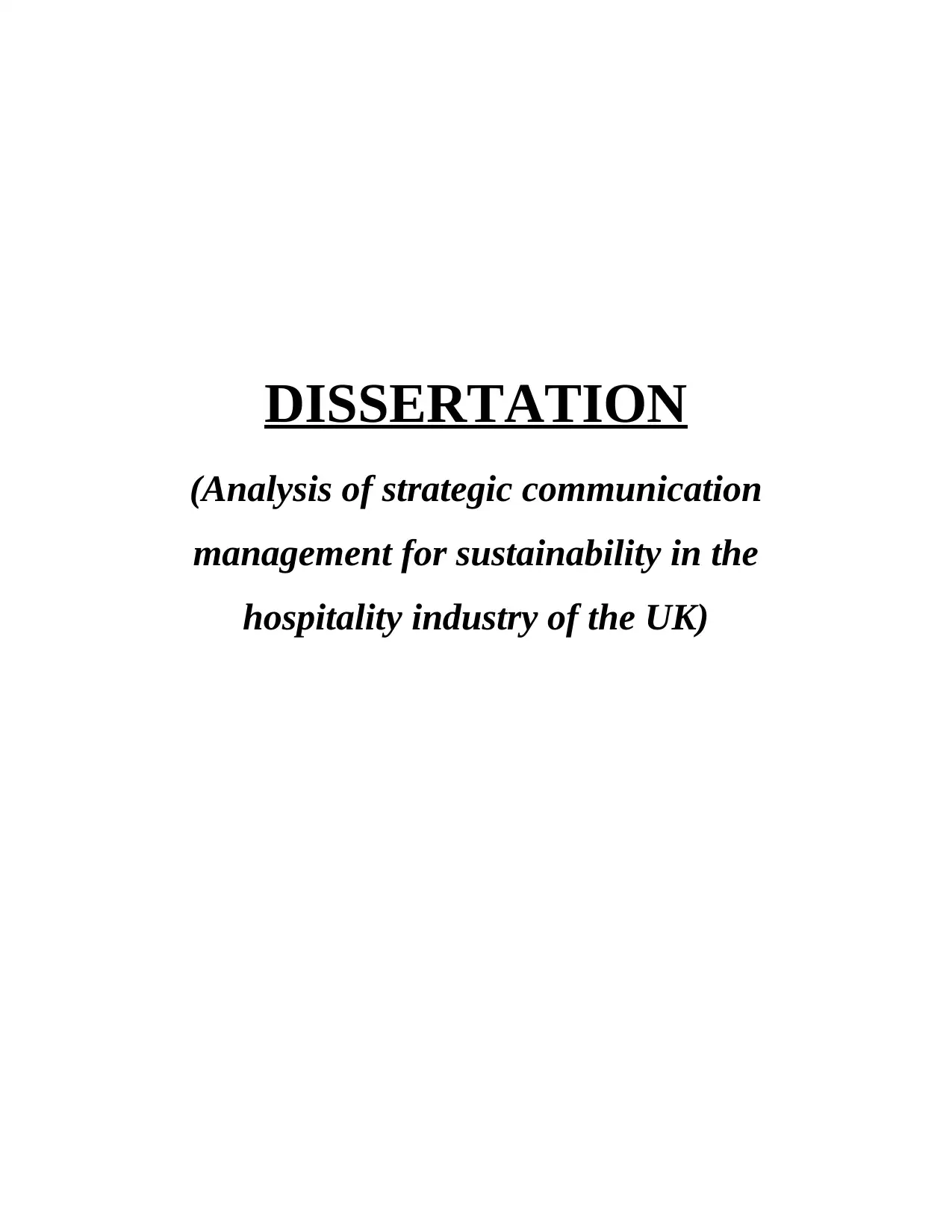
DISSERTATION
(Analysis of strategic communication
management for sustainability in the
hospitality industry of the UK)
(Analysis of strategic communication
management for sustainability in the
hospitality industry of the UK)
Paraphrase This Document
Need a fresh take? Get an instant paraphrase of this document with our AI Paraphraser
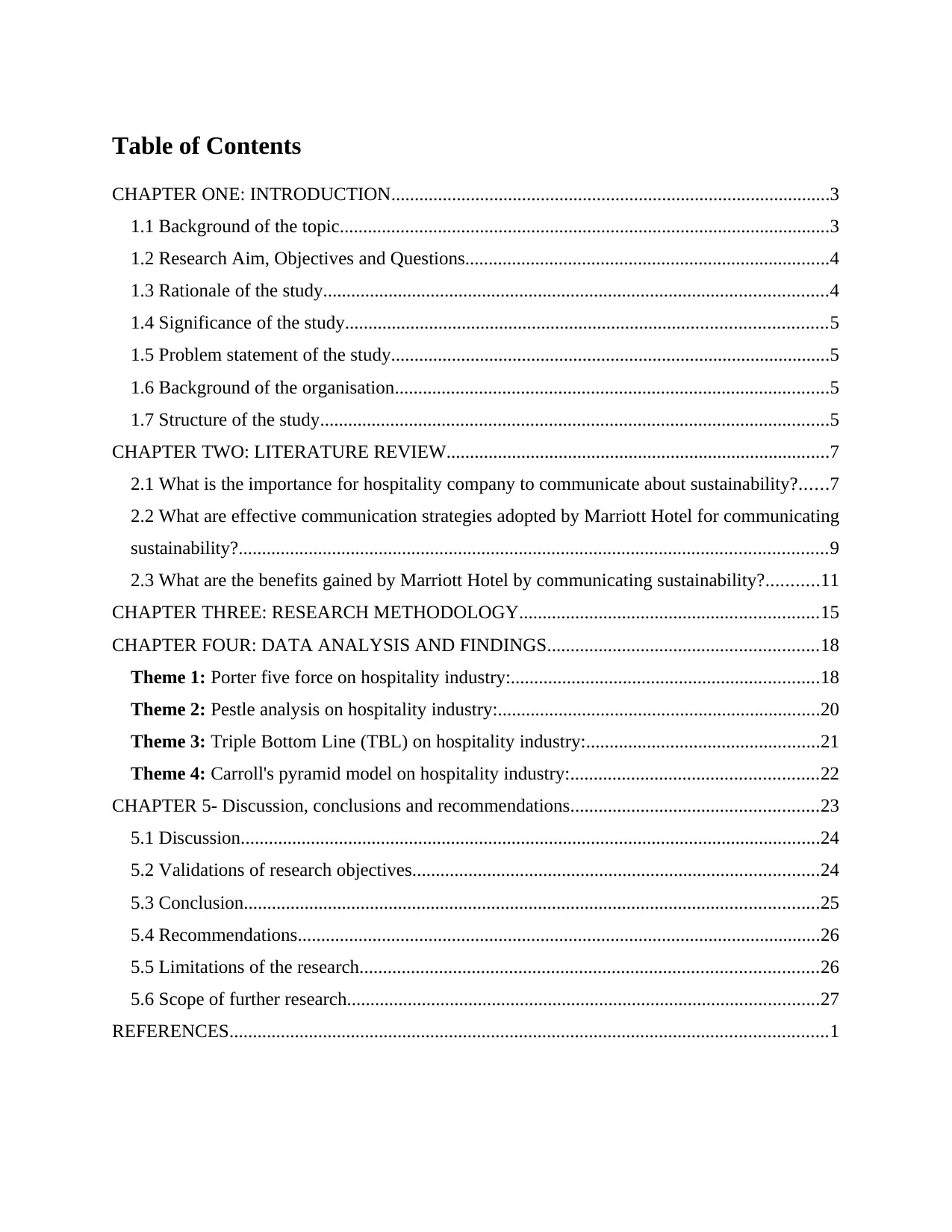
Table of Contents
CHAPTER ONE: INTRODUCTION..............................................................................................3
1.1 Background of the topic.........................................................................................................3
1.2 Research Aim, Objectives and Questions..............................................................................4
1.3 Rationale of the study............................................................................................................4
1.4 Significance of the study.......................................................................................................5
1.5 Problem statement of the study..............................................................................................5
1.6 Background of the organisation.............................................................................................5
1.7 Structure of the study.............................................................................................................5
CHAPTER TWO: LITERATURE REVIEW..................................................................................7
2.1 What is the importance for hospitality company to communicate about sustainability?......7
2.2 What are effective communication strategies adopted by Marriott Hotel for communicating
sustainability?..............................................................................................................................9
2.3 What are the benefits gained by Marriott Hotel by communicating sustainability?...........11
CHAPTER THREE: RESEARCH METHODOLOGY................................................................15
CHAPTER FOUR: DATA ANALYSIS AND FINDINGS..........................................................18
Theme 1: Porter five force on hospitality industry:..................................................................18
Theme 2: Pestle analysis on hospitality industry:.....................................................................20
Theme 3: Triple Bottom Line (TBL) on hospitality industry:..................................................21
Theme 4: Carroll's pyramid model on hospitality industry:.....................................................22
CHAPTER 5- Discussion, conclusions and recommendations.....................................................23
5.1 Discussion............................................................................................................................24
5.2 Validations of research objectives.......................................................................................24
5.3 Conclusion...........................................................................................................................25
5.4 Recommendations................................................................................................................26
5.5 Limitations of the research..................................................................................................26
5.6 Scope of further research.....................................................................................................27
REFERENCES................................................................................................................................1
CHAPTER ONE: INTRODUCTION..............................................................................................3
1.1 Background of the topic.........................................................................................................3
1.2 Research Aim, Objectives and Questions..............................................................................4
1.3 Rationale of the study............................................................................................................4
1.4 Significance of the study.......................................................................................................5
1.5 Problem statement of the study..............................................................................................5
1.6 Background of the organisation.............................................................................................5
1.7 Structure of the study.............................................................................................................5
CHAPTER TWO: LITERATURE REVIEW..................................................................................7
2.1 What is the importance for hospitality company to communicate about sustainability?......7
2.2 What are effective communication strategies adopted by Marriott Hotel for communicating
sustainability?..............................................................................................................................9
2.3 What are the benefits gained by Marriott Hotel by communicating sustainability?...........11
CHAPTER THREE: RESEARCH METHODOLOGY................................................................15
CHAPTER FOUR: DATA ANALYSIS AND FINDINGS..........................................................18
Theme 1: Porter five force on hospitality industry:..................................................................18
Theme 2: Pestle analysis on hospitality industry:.....................................................................20
Theme 3: Triple Bottom Line (TBL) on hospitality industry:..................................................21
Theme 4: Carroll's pyramid model on hospitality industry:.....................................................22
CHAPTER 5- Discussion, conclusions and recommendations.....................................................23
5.1 Discussion............................................................................................................................24
5.2 Validations of research objectives.......................................................................................24
5.3 Conclusion...........................................................................................................................25
5.4 Recommendations................................................................................................................26
5.5 Limitations of the research..................................................................................................26
5.6 Scope of further research.....................................................................................................27
REFERENCES................................................................................................................................1

CHAPTER ONE: INTRODUCTION
⊘ This is a preview!⊘
Do you want full access?
Subscribe today to unlock all pages.

Trusted by 1+ million students worldwide
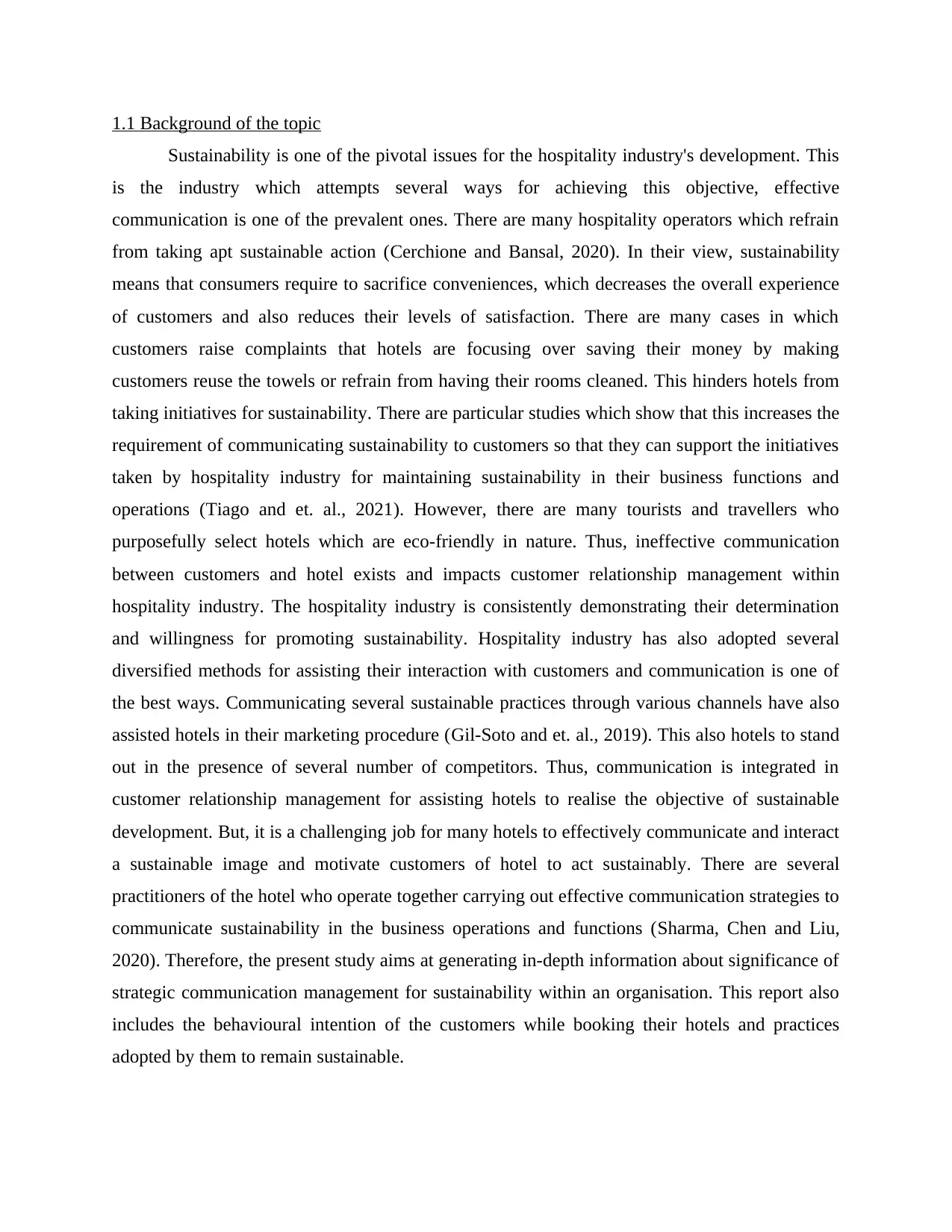
1.1 Background of the topic
Sustainability is one of the pivotal issues for the hospitality industry's development. This
is the industry which attempts several ways for achieving this objective, effective
communication is one of the prevalent ones. There are many hospitality operators which refrain
from taking apt sustainable action (Cerchione and Bansal, 2020). In their view, sustainability
means that consumers require to sacrifice conveniences, which decreases the overall experience
of customers and also reduces their levels of satisfaction. There are many cases in which
customers raise complaints that hotels are focusing over saving their money by making
customers reuse the towels or refrain from having their rooms cleaned. This hinders hotels from
taking initiatives for sustainability. There are particular studies which show that this increases the
requirement of communicating sustainability to customers so that they can support the initiatives
taken by hospitality industry for maintaining sustainability in their business functions and
operations (Tiago and et. al., 2021). However, there are many tourists and travellers who
purposefully select hotels which are eco-friendly in nature. Thus, ineffective communication
between customers and hotel exists and impacts customer relationship management within
hospitality industry. The hospitality industry is consistently demonstrating their determination
and willingness for promoting sustainability. Hospitality industry has also adopted several
diversified methods for assisting their interaction with customers and communication is one of
the best ways. Communicating several sustainable practices through various channels have also
assisted hotels in their marketing procedure (Gil-Soto and et. al., 2019). This also hotels to stand
out in the presence of several number of competitors. Thus, communication is integrated in
customer relationship management for assisting hotels to realise the objective of sustainable
development. But, it is a challenging job for many hotels to effectively communicate and interact
a sustainable image and motivate customers of hotel to act sustainably. There are several
practitioners of the hotel who operate together carrying out effective communication strategies to
communicate sustainability in the business operations and functions (Sharma, Chen and Liu,
2020). Therefore, the present study aims at generating in-depth information about significance of
strategic communication management for sustainability within an organisation. This report also
includes the behavioural intention of the customers while booking their hotels and practices
adopted by them to remain sustainable.
Sustainability is one of the pivotal issues for the hospitality industry's development. This
is the industry which attempts several ways for achieving this objective, effective
communication is one of the prevalent ones. There are many hospitality operators which refrain
from taking apt sustainable action (Cerchione and Bansal, 2020). In their view, sustainability
means that consumers require to sacrifice conveniences, which decreases the overall experience
of customers and also reduces their levels of satisfaction. There are many cases in which
customers raise complaints that hotels are focusing over saving their money by making
customers reuse the towels or refrain from having their rooms cleaned. This hinders hotels from
taking initiatives for sustainability. There are particular studies which show that this increases the
requirement of communicating sustainability to customers so that they can support the initiatives
taken by hospitality industry for maintaining sustainability in their business functions and
operations (Tiago and et. al., 2021). However, there are many tourists and travellers who
purposefully select hotels which are eco-friendly in nature. Thus, ineffective communication
between customers and hotel exists and impacts customer relationship management within
hospitality industry. The hospitality industry is consistently demonstrating their determination
and willingness for promoting sustainability. Hospitality industry has also adopted several
diversified methods for assisting their interaction with customers and communication is one of
the best ways. Communicating several sustainable practices through various channels have also
assisted hotels in their marketing procedure (Gil-Soto and et. al., 2019). This also hotels to stand
out in the presence of several number of competitors. Thus, communication is integrated in
customer relationship management for assisting hotels to realise the objective of sustainable
development. But, it is a challenging job for many hotels to effectively communicate and interact
a sustainable image and motivate customers of hotel to act sustainably. There are several
practitioners of the hotel who operate together carrying out effective communication strategies to
communicate sustainability in the business operations and functions (Sharma, Chen and Liu,
2020). Therefore, the present study aims at generating in-depth information about significance of
strategic communication management for sustainability within an organisation. This report also
includes the behavioural intention of the customers while booking their hotels and practices
adopted by them to remain sustainable.
Paraphrase This Document
Need a fresh take? Get an instant paraphrase of this document with our AI Paraphraser
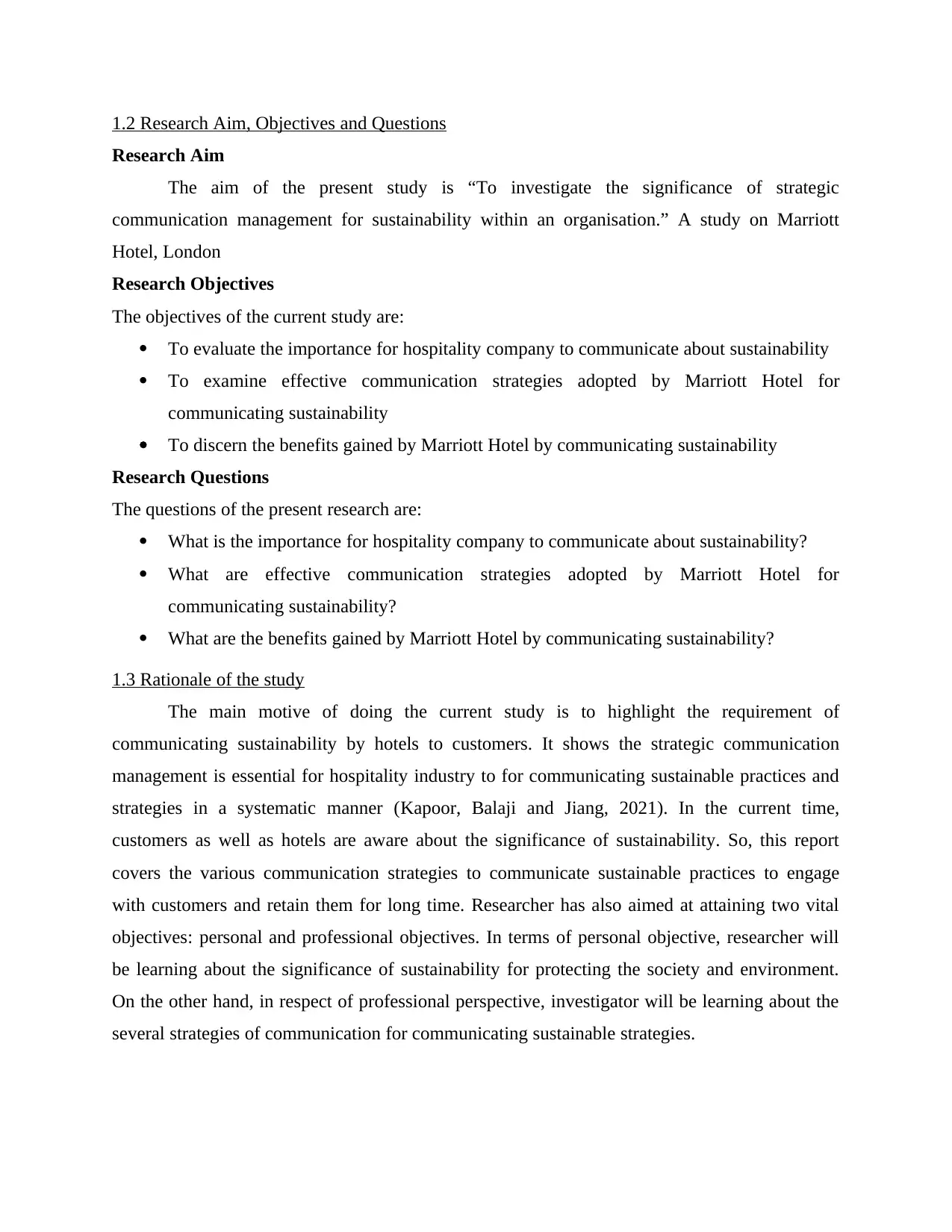
1.2 Research Aim, Objectives and Questions
Research Aim
The aim of the present study is “To investigate the significance of strategic
communication management for sustainability within an organisation.” A study on Marriott
Hotel, London
Research Objectives
The objectives of the current study are:
To evaluate the importance for hospitality company to communicate about sustainability
To examine effective communication strategies adopted by Marriott Hotel for
communicating sustainability
To discern the benefits gained by Marriott Hotel by communicating sustainability
Research Questions
The questions of the present research are:
What is the importance for hospitality company to communicate about sustainability?
What are effective communication strategies adopted by Marriott Hotel for
communicating sustainability?
What are the benefits gained by Marriott Hotel by communicating sustainability?
1.3 Rationale of the study
The main motive of doing the current study is to highlight the requirement of
communicating sustainability by hotels to customers. It shows the strategic communication
management is essential for hospitality industry to for communicating sustainable practices and
strategies in a systematic manner (Kapoor, Balaji and Jiang, 2021). In the current time,
customers as well as hotels are aware about the significance of sustainability. So, this report
covers the various communication strategies to communicate sustainable practices to engage
with customers and retain them for long time. Researcher has also aimed at attaining two vital
objectives: personal and professional objectives. In terms of personal objective, researcher will
be learning about the significance of sustainability for protecting the society and environment.
On the other hand, in respect of professional perspective, investigator will be learning about the
several strategies of communication for communicating sustainable strategies.
Research Aim
The aim of the present study is “To investigate the significance of strategic
communication management for sustainability within an organisation.” A study on Marriott
Hotel, London
Research Objectives
The objectives of the current study are:
To evaluate the importance for hospitality company to communicate about sustainability
To examine effective communication strategies adopted by Marriott Hotel for
communicating sustainability
To discern the benefits gained by Marriott Hotel by communicating sustainability
Research Questions
The questions of the present research are:
What is the importance for hospitality company to communicate about sustainability?
What are effective communication strategies adopted by Marriott Hotel for
communicating sustainability?
What are the benefits gained by Marriott Hotel by communicating sustainability?
1.3 Rationale of the study
The main motive of doing the current study is to highlight the requirement of
communicating sustainability by hotels to customers. It shows the strategic communication
management is essential for hospitality industry to for communicating sustainable practices and
strategies in a systematic manner (Kapoor, Balaji and Jiang, 2021). In the current time,
customers as well as hotels are aware about the significance of sustainability. So, this report
covers the various communication strategies to communicate sustainable practices to engage
with customers and retain them for long time. Researcher has also aimed at attaining two vital
objectives: personal and professional objectives. In terms of personal objective, researcher will
be learning about the significance of sustainability for protecting the society and environment.
On the other hand, in respect of professional perspective, investigator will be learning about the
several strategies of communication for communicating sustainable strategies.
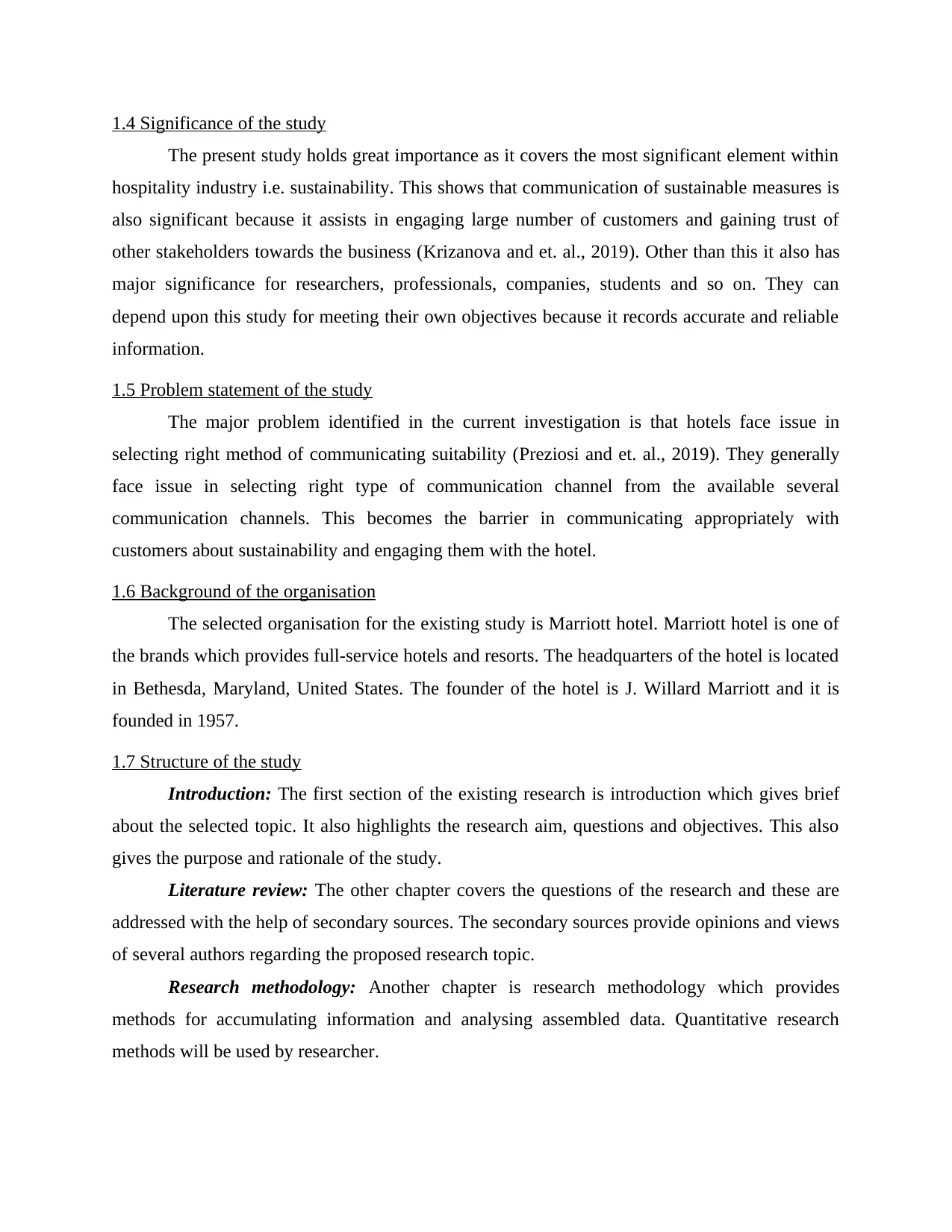
1.4 Significance of the study
The present study holds great importance as it covers the most significant element within
hospitality industry i.e. sustainability. This shows that communication of sustainable measures is
also significant because it assists in engaging large number of customers and gaining trust of
other stakeholders towards the business (Krizanova and et. al., 2019). Other than this it also has
major significance for researchers, professionals, companies, students and so on. They can
depend upon this study for meeting their own objectives because it records accurate and reliable
information.
1.5 Problem statement of the study
The major problem identified in the current investigation is that hotels face issue in
selecting right method of communicating suitability (Preziosi and et. al., 2019). They generally
face issue in selecting right type of communication channel from the available several
communication channels. This becomes the barrier in communicating appropriately with
customers about sustainability and engaging them with the hotel.
1.6 Background of the organisation
The selected organisation for the existing study is Marriott hotel. Marriott hotel is one of
the brands which provides full-service hotels and resorts. The headquarters of the hotel is located
in Bethesda, Maryland, United States. The founder of the hotel is J. Willard Marriott and it is
founded in 1957.
1.7 Structure of the study
Introduction: The first section of the existing research is introduction which gives brief
about the selected topic. It also highlights the research aim, questions and objectives. This also
gives the purpose and rationale of the study.
Literature review: The other chapter covers the questions of the research and these are
addressed with the help of secondary sources. The secondary sources provide opinions and views
of several authors regarding the proposed research topic.
Research methodology: Another chapter is research methodology which provides
methods for accumulating information and analysing assembled data. Quantitative research
methods will be used by researcher.
The present study holds great importance as it covers the most significant element within
hospitality industry i.e. sustainability. This shows that communication of sustainable measures is
also significant because it assists in engaging large number of customers and gaining trust of
other stakeholders towards the business (Krizanova and et. al., 2019). Other than this it also has
major significance for researchers, professionals, companies, students and so on. They can
depend upon this study for meeting their own objectives because it records accurate and reliable
information.
1.5 Problem statement of the study
The major problem identified in the current investigation is that hotels face issue in
selecting right method of communicating suitability (Preziosi and et. al., 2019). They generally
face issue in selecting right type of communication channel from the available several
communication channels. This becomes the barrier in communicating appropriately with
customers about sustainability and engaging them with the hotel.
1.6 Background of the organisation
The selected organisation for the existing study is Marriott hotel. Marriott hotel is one of
the brands which provides full-service hotels and resorts. The headquarters of the hotel is located
in Bethesda, Maryland, United States. The founder of the hotel is J. Willard Marriott and it is
founded in 1957.
1.7 Structure of the study
Introduction: The first section of the existing research is introduction which gives brief
about the selected topic. It also highlights the research aim, questions and objectives. This also
gives the purpose and rationale of the study.
Literature review: The other chapter covers the questions of the research and these are
addressed with the help of secondary sources. The secondary sources provide opinions and views
of several authors regarding the proposed research topic.
Research methodology: Another chapter is research methodology which provides
methods for accumulating information and analysing assembled data. Quantitative research
methods will be used by researcher.
⊘ This is a preview!⊘
Do you want full access?
Subscribe today to unlock all pages.

Trusted by 1+ million students worldwide
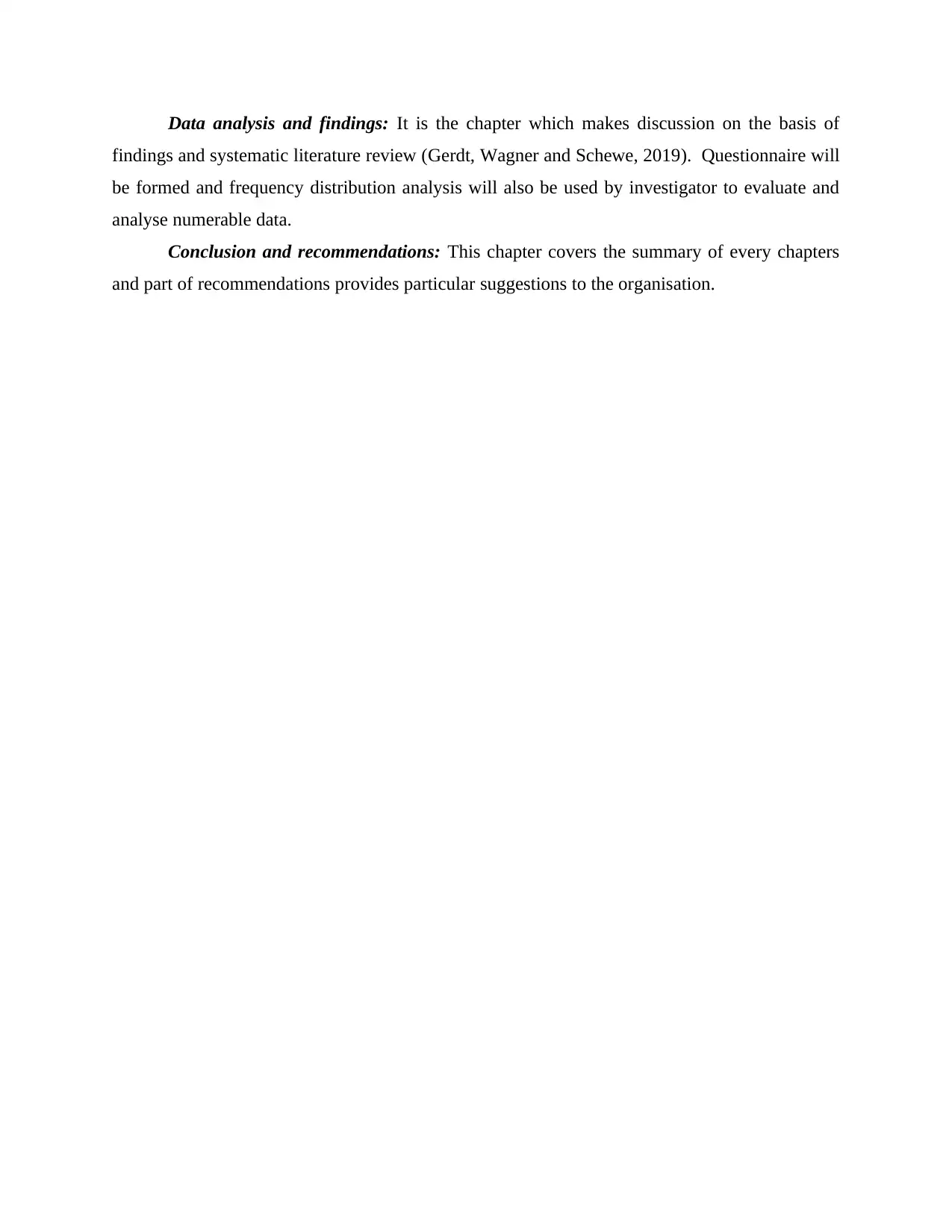
Data analysis and findings: It is the chapter which makes discussion on the basis of
findings and systematic literature review (Gerdt, Wagner and Schewe, 2019). Questionnaire will
be formed and frequency distribution analysis will also be used by investigator to evaluate and
analyse numerable data.
Conclusion and recommendations: This chapter covers the summary of every chapters
and part of recommendations provides particular suggestions to the organisation.
findings and systematic literature review (Gerdt, Wagner and Schewe, 2019). Questionnaire will
be formed and frequency distribution analysis will also be used by investigator to evaluate and
analyse numerable data.
Conclusion and recommendations: This chapter covers the summary of every chapters
and part of recommendations provides particular suggestions to the organisation.
Paraphrase This Document
Need a fresh take? Get an instant paraphrase of this document with our AI Paraphraser
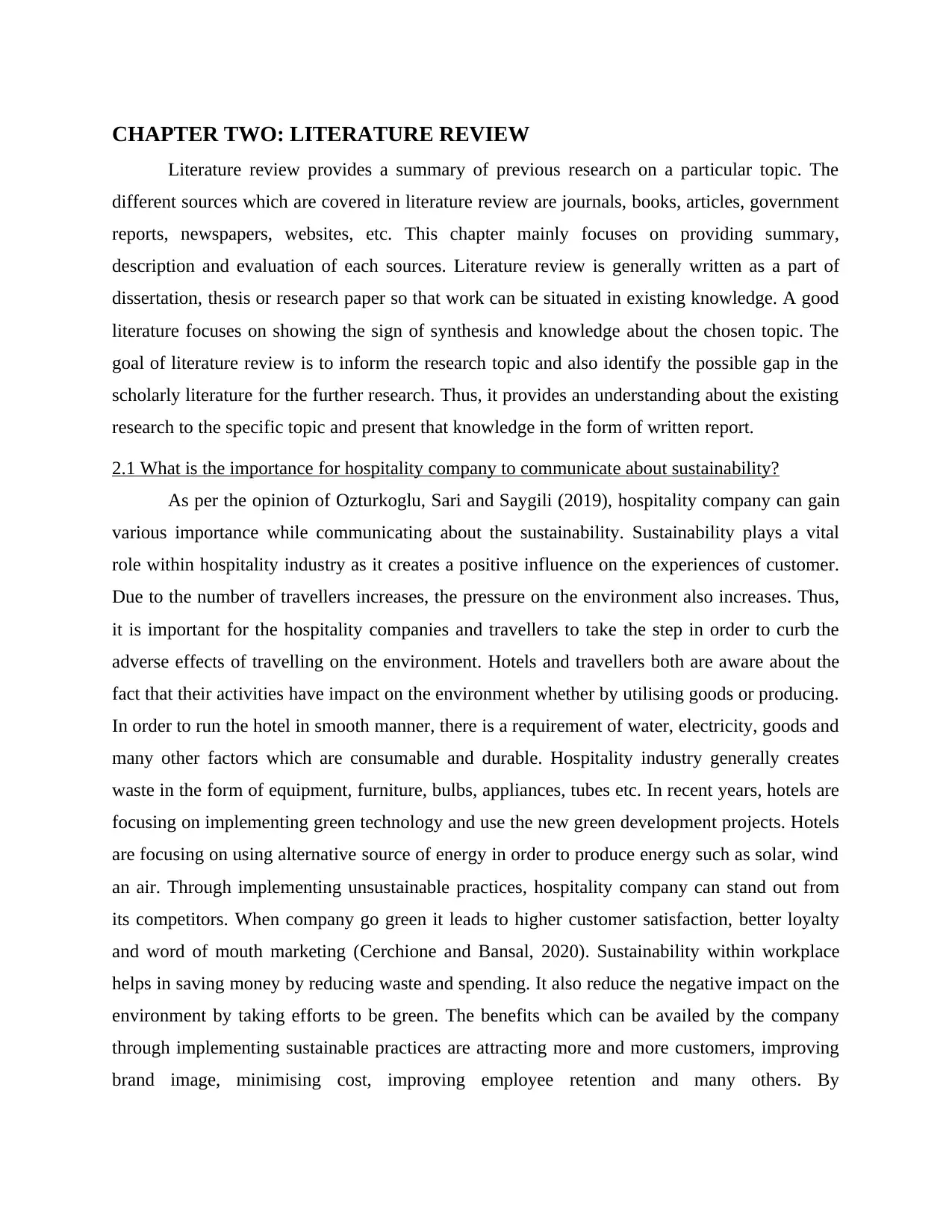
CHAPTER TWO: LITERATURE REVIEW
Literature review provides a summary of previous research on a particular topic. The
different sources which are covered in literature review are journals, books, articles, government
reports, newspapers, websites, etc. This chapter mainly focuses on providing summary,
description and evaluation of each sources. Literature review is generally written as a part of
dissertation, thesis or research paper so that work can be situated in existing knowledge. A good
literature focuses on showing the sign of synthesis and knowledge about the chosen topic. The
goal of literature review is to inform the research topic and also identify the possible gap in the
scholarly literature for the further research. Thus, it provides an understanding about the existing
research to the specific topic and present that knowledge in the form of written report.
2.1 What is the importance for hospitality company to communicate about sustainability?
As per the opinion of Ozturkoglu, Sari and Saygili (2019), hospitality company can gain
various importance while communicating about the sustainability. Sustainability plays a vital
role within hospitality industry as it creates a positive influence on the experiences of customer.
Due to the number of travellers increases, the pressure on the environment also increases. Thus,
it is important for the hospitality companies and travellers to take the step in order to curb the
adverse effects of travelling on the environment. Hotels and travellers both are aware about the
fact that their activities have impact on the environment whether by utilising goods or producing.
In order to run the hotel in smooth manner, there is a requirement of water, electricity, goods and
many other factors which are consumable and durable. Hospitality industry generally creates
waste in the form of equipment, furniture, bulbs, appliances, tubes etc. In recent years, hotels are
focusing on implementing green technology and use the new green development projects. Hotels
are focusing on using alternative source of energy in order to produce energy such as solar, wind
an air. Through implementing unsustainable practices, hospitality company can stand out from
its competitors. When company go green it leads to higher customer satisfaction, better loyalty
and word of mouth marketing (Cerchione and Bansal, 2020). Sustainability within workplace
helps in saving money by reducing waste and spending. It also reduce the negative impact on the
environment by taking efforts to be green. The benefits which can be availed by the company
through implementing sustainable practices are attracting more and more customers, improving
brand image, minimising cost, improving employee retention and many others. By
Literature review provides a summary of previous research on a particular topic. The
different sources which are covered in literature review are journals, books, articles, government
reports, newspapers, websites, etc. This chapter mainly focuses on providing summary,
description and evaluation of each sources. Literature review is generally written as a part of
dissertation, thesis or research paper so that work can be situated in existing knowledge. A good
literature focuses on showing the sign of synthesis and knowledge about the chosen topic. The
goal of literature review is to inform the research topic and also identify the possible gap in the
scholarly literature for the further research. Thus, it provides an understanding about the existing
research to the specific topic and present that knowledge in the form of written report.
2.1 What is the importance for hospitality company to communicate about sustainability?
As per the opinion of Ozturkoglu, Sari and Saygili (2019), hospitality company can gain
various importance while communicating about the sustainability. Sustainability plays a vital
role within hospitality industry as it creates a positive influence on the experiences of customer.
Due to the number of travellers increases, the pressure on the environment also increases. Thus,
it is important for the hospitality companies and travellers to take the step in order to curb the
adverse effects of travelling on the environment. Hotels and travellers both are aware about the
fact that their activities have impact on the environment whether by utilising goods or producing.
In order to run the hotel in smooth manner, there is a requirement of water, electricity, goods and
many other factors which are consumable and durable. Hospitality industry generally creates
waste in the form of equipment, furniture, bulbs, appliances, tubes etc. In recent years, hotels are
focusing on implementing green technology and use the new green development projects. Hotels
are focusing on using alternative source of energy in order to produce energy such as solar, wind
an air. Through implementing unsustainable practices, hospitality company can stand out from
its competitors. When company go green it leads to higher customer satisfaction, better loyalty
and word of mouth marketing (Cerchione and Bansal, 2020). Sustainability within workplace
helps in saving money by reducing waste and spending. It also reduce the negative impact on the
environment by taking efforts to be green. The benefits which can be availed by the company
through implementing sustainable practices are attracting more and more customers, improving
brand image, minimising cost, improving employee retention and many others. By
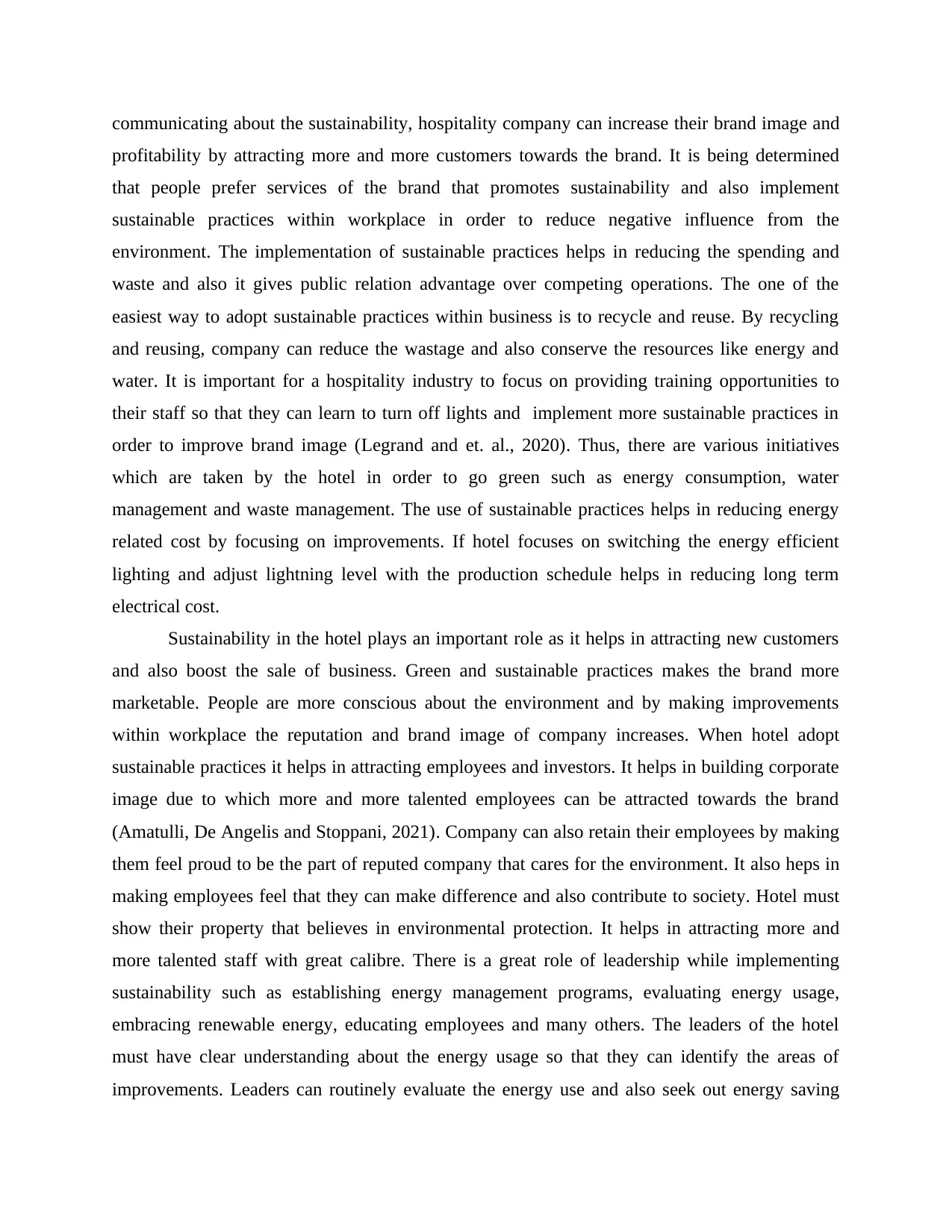
communicating about the sustainability, hospitality company can increase their brand image and
profitability by attracting more and more customers towards the brand. It is being determined
that people prefer services of the brand that promotes sustainability and also implement
sustainable practices within workplace in order to reduce negative influence from the
environment. The implementation of sustainable practices helps in reducing the spending and
waste and also it gives public relation advantage over competing operations. The one of the
easiest way to adopt sustainable practices within business is to recycle and reuse. By recycling
and reusing, company can reduce the wastage and also conserve the resources like energy and
water. It is important for a hospitality industry to focus on providing training opportunities to
their staff so that they can learn to turn off lights and implement more sustainable practices in
order to improve brand image (Legrand and et. al., 2020). Thus, there are various initiatives
which are taken by the hotel in order to go green such as energy consumption, water
management and waste management. The use of sustainable practices helps in reducing energy
related cost by focusing on improvements. If hotel focuses on switching the energy efficient
lighting and adjust lightning level with the production schedule helps in reducing long term
electrical cost.
Sustainability in the hotel plays an important role as it helps in attracting new customers
and also boost the sale of business. Green and sustainable practices makes the brand more
marketable. People are more conscious about the environment and by making improvements
within workplace the reputation and brand image of company increases. When hotel adopt
sustainable practices it helps in attracting employees and investors. It helps in building corporate
image due to which more and more talented employees can be attracted towards the brand
(Amatulli, De Angelis and Stoppani, 2021). Company can also retain their employees by making
them feel proud to be the part of reputed company that cares for the environment. It also heps in
making employees feel that they can make difference and also contribute to society. Hotel must
show their property that believes in environmental protection. It helps in attracting more and
more talented staff with great calibre. There is a great role of leadership while implementing
sustainability such as establishing energy management programs, evaluating energy usage,
embracing renewable energy, educating employees and many others. The leaders of the hotel
must have clear understanding about the energy usage so that they can identify the areas of
improvements. Leaders can routinely evaluate the energy use and also seek out energy saving
profitability by attracting more and more customers towards the brand. It is being determined
that people prefer services of the brand that promotes sustainability and also implement
sustainable practices within workplace in order to reduce negative influence from the
environment. The implementation of sustainable practices helps in reducing the spending and
waste and also it gives public relation advantage over competing operations. The one of the
easiest way to adopt sustainable practices within business is to recycle and reuse. By recycling
and reusing, company can reduce the wastage and also conserve the resources like energy and
water. It is important for a hospitality industry to focus on providing training opportunities to
their staff so that they can learn to turn off lights and implement more sustainable practices in
order to improve brand image (Legrand and et. al., 2020). Thus, there are various initiatives
which are taken by the hotel in order to go green such as energy consumption, water
management and waste management. The use of sustainable practices helps in reducing energy
related cost by focusing on improvements. If hotel focuses on switching the energy efficient
lighting and adjust lightning level with the production schedule helps in reducing long term
electrical cost.
Sustainability in the hotel plays an important role as it helps in attracting new customers
and also boost the sale of business. Green and sustainable practices makes the brand more
marketable. People are more conscious about the environment and by making improvements
within workplace the reputation and brand image of company increases. When hotel adopt
sustainable practices it helps in attracting employees and investors. It helps in building corporate
image due to which more and more talented employees can be attracted towards the brand
(Amatulli, De Angelis and Stoppani, 2021). Company can also retain their employees by making
them feel proud to be the part of reputed company that cares for the environment. It also heps in
making employees feel that they can make difference and also contribute to society. Hotel must
show their property that believes in environmental protection. It helps in attracting more and
more talented staff with great calibre. There is a great role of leadership while implementing
sustainability such as establishing energy management programs, evaluating energy usage,
embracing renewable energy, educating employees and many others. The leaders of the hotel
must have clear understanding about the energy usage so that they can identify the areas of
improvements. Leaders can routinely evaluate the energy use and also seek out energy saving
⊘ This is a preview!⊘
Do you want full access?
Subscribe today to unlock all pages.

Trusted by 1+ million students worldwide
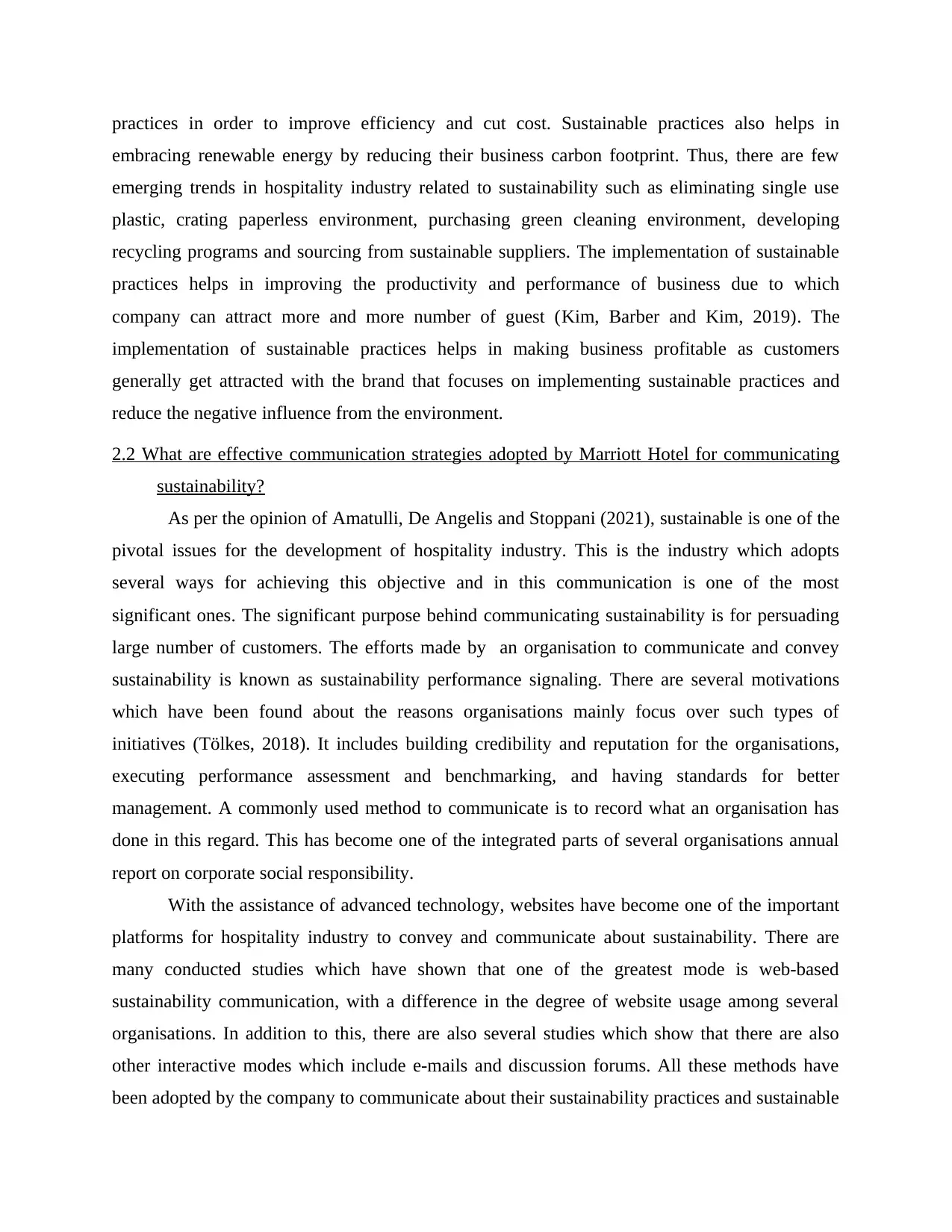
practices in order to improve efficiency and cut cost. Sustainable practices also helps in
embracing renewable energy by reducing their business carbon footprint. Thus, there are few
emerging trends in hospitality industry related to sustainability such as eliminating single use
plastic, crating paperless environment, purchasing green cleaning environment, developing
recycling programs and sourcing from sustainable suppliers. The implementation of sustainable
practices helps in improving the productivity and performance of business due to which
company can attract more and more number of guest (Kim, Barber and Kim, 2019). The
implementation of sustainable practices helps in making business profitable as customers
generally get attracted with the brand that focuses on implementing sustainable practices and
reduce the negative influence from the environment.
2.2 What are effective communication strategies adopted by Marriott Hotel for communicating
sustainability?
As per the opinion of Amatulli, De Angelis and Stoppani (2021), sustainable is one of the
pivotal issues for the development of hospitality industry. This is the industry which adopts
several ways for achieving this objective and in this communication is one of the most
significant ones. The significant purpose behind communicating sustainability is for persuading
large number of customers. The efforts made by an organisation to communicate and convey
sustainability is known as sustainability performance signaling. There are several motivations
which have been found about the reasons organisations mainly focus over such types of
initiatives (Tölkes, 2018). It includes building credibility and reputation for the organisations,
executing performance assessment and benchmarking, and having standards for better
management. A commonly used method to communicate is to record what an organisation has
done in this regard. This has become one of the integrated parts of several organisations annual
report on corporate social responsibility.
With the assistance of advanced technology, websites have become one of the important
platforms for hospitality industry to convey and communicate about sustainability. There are
many conducted studies which have shown that one of the greatest mode is web-based
sustainability communication, with a difference in the degree of website usage among several
organisations. In addition to this, there are also several studies which show that there are also
other interactive modes which include e-mails and discussion forums. All these methods have
been adopted by the company to communicate about their sustainability practices and sustainable
embracing renewable energy by reducing their business carbon footprint. Thus, there are few
emerging trends in hospitality industry related to sustainability such as eliminating single use
plastic, crating paperless environment, purchasing green cleaning environment, developing
recycling programs and sourcing from sustainable suppliers. The implementation of sustainable
practices helps in improving the productivity and performance of business due to which
company can attract more and more number of guest (Kim, Barber and Kim, 2019). The
implementation of sustainable practices helps in making business profitable as customers
generally get attracted with the brand that focuses on implementing sustainable practices and
reduce the negative influence from the environment.
2.2 What are effective communication strategies adopted by Marriott Hotel for communicating
sustainability?
As per the opinion of Amatulli, De Angelis and Stoppani (2021), sustainable is one of the
pivotal issues for the development of hospitality industry. This is the industry which adopts
several ways for achieving this objective and in this communication is one of the most
significant ones. The significant purpose behind communicating sustainability is for persuading
large number of customers. The efforts made by an organisation to communicate and convey
sustainability is known as sustainability performance signaling. There are several motivations
which have been found about the reasons organisations mainly focus over such types of
initiatives (Tölkes, 2018). It includes building credibility and reputation for the organisations,
executing performance assessment and benchmarking, and having standards for better
management. A commonly used method to communicate is to record what an organisation has
done in this regard. This has become one of the integrated parts of several organisations annual
report on corporate social responsibility.
With the assistance of advanced technology, websites have become one of the important
platforms for hospitality industry to convey and communicate about sustainability. There are
many conducted studies which have shown that one of the greatest mode is web-based
sustainability communication, with a difference in the degree of website usage among several
organisations. In addition to this, there are also several studies which show that there are also
other interactive modes which include e-mails and discussion forums. All these methods have
been adopted by the company to communicate about their sustainability practices and sustainable
Paraphrase This Document
Need a fresh take? Get an instant paraphrase of this document with our AI Paraphraser
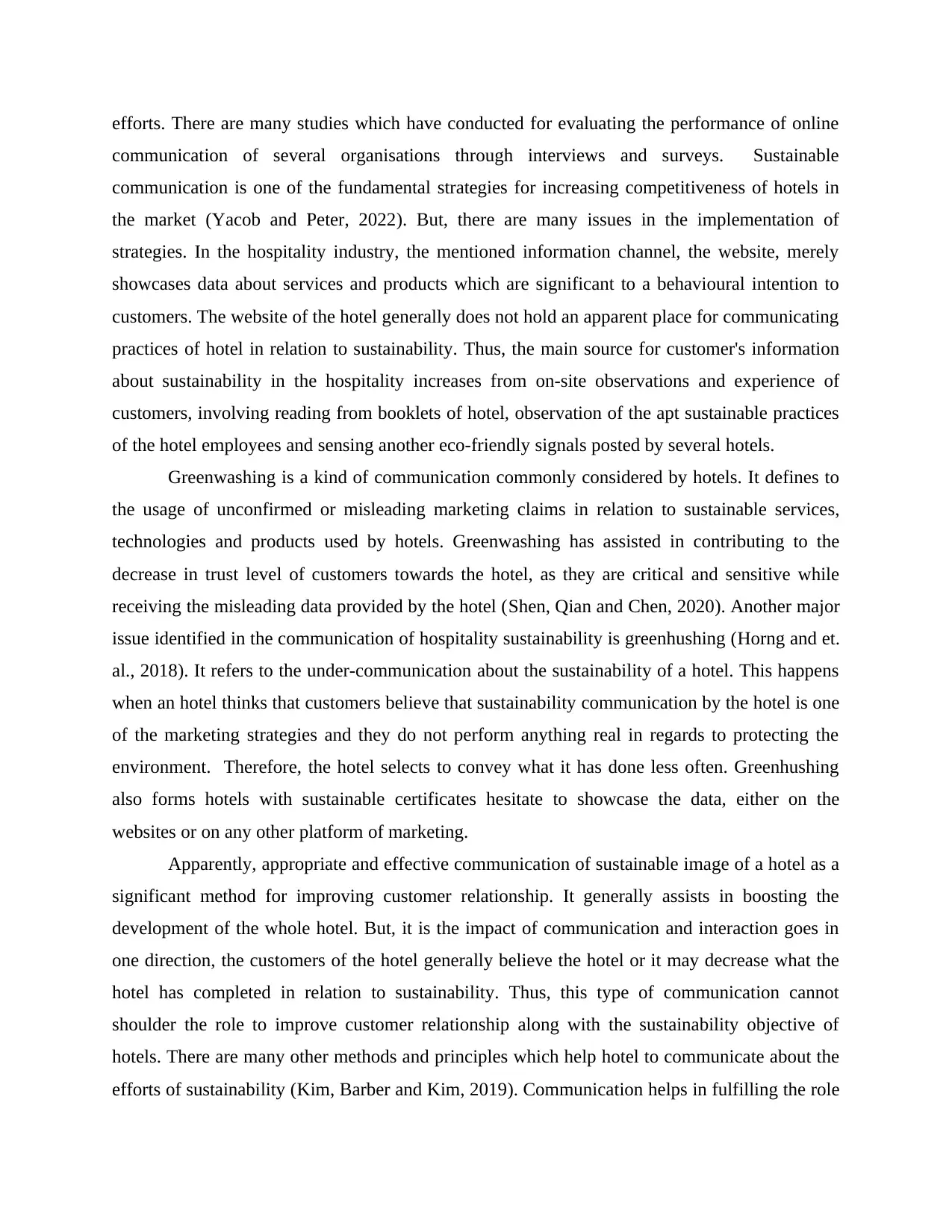
efforts. There are many studies which have conducted for evaluating the performance of online
communication of several organisations through interviews and surveys. Sustainable
communication is one of the fundamental strategies for increasing competitiveness of hotels in
the market (Yacob and Peter, 2022). But, there are many issues in the implementation of
strategies. In the hospitality industry, the mentioned information channel, the website, merely
showcases data about services and products which are significant to a behavioural intention to
customers. The website of the hotel generally does not hold an apparent place for communicating
practices of hotel in relation to sustainability. Thus, the main source for customer's information
about sustainability in the hospitality increases from on-site observations and experience of
customers, involving reading from booklets of hotel, observation of the apt sustainable practices
of the hotel employees and sensing another eco-friendly signals posted by several hotels.
Greenwashing is a kind of communication commonly considered by hotels. It defines to
the usage of unconfirmed or misleading marketing claims in relation to sustainable services,
technologies and products used by hotels. Greenwashing has assisted in contributing to the
decrease in trust level of customers towards the hotel, as they are critical and sensitive while
receiving the misleading data provided by the hotel (Shen, Qian and Chen, 2020). Another major
issue identified in the communication of hospitality sustainability is greenhushing (Horng and et.
al., 2018). It refers to the under-communication about the sustainability of a hotel. This happens
when an hotel thinks that customers believe that sustainability communication by the hotel is one
of the marketing strategies and they do not perform anything real in regards to protecting the
environment. Therefore, the hotel selects to convey what it has done less often. Greenhushing
also forms hotels with sustainable certificates hesitate to showcase the data, either on the
websites or on any other platform of marketing.
Apparently, appropriate and effective communication of sustainable image of a hotel as a
significant method for improving customer relationship. It generally assists in boosting the
development of the whole hotel. But, it is the impact of communication and interaction goes in
one direction, the customers of the hotel generally believe the hotel or it may decrease what the
hotel has completed in relation to sustainability. Thus, this type of communication cannot
shoulder the role to improve customer relationship along with the sustainability objective of
hotels. There are many other methods and principles which help hotel to communicate about the
efforts of sustainability (Kim, Barber and Kim, 2019). Communication helps in fulfilling the role
communication of several organisations through interviews and surveys. Sustainable
communication is one of the fundamental strategies for increasing competitiveness of hotels in
the market (Yacob and Peter, 2022). But, there are many issues in the implementation of
strategies. In the hospitality industry, the mentioned information channel, the website, merely
showcases data about services and products which are significant to a behavioural intention to
customers. The website of the hotel generally does not hold an apparent place for communicating
practices of hotel in relation to sustainability. Thus, the main source for customer's information
about sustainability in the hospitality increases from on-site observations and experience of
customers, involving reading from booklets of hotel, observation of the apt sustainable practices
of the hotel employees and sensing another eco-friendly signals posted by several hotels.
Greenwashing is a kind of communication commonly considered by hotels. It defines to
the usage of unconfirmed or misleading marketing claims in relation to sustainable services,
technologies and products used by hotels. Greenwashing has assisted in contributing to the
decrease in trust level of customers towards the hotel, as they are critical and sensitive while
receiving the misleading data provided by the hotel (Shen, Qian and Chen, 2020). Another major
issue identified in the communication of hospitality sustainability is greenhushing (Horng and et.
al., 2018). It refers to the under-communication about the sustainability of a hotel. This happens
when an hotel thinks that customers believe that sustainability communication by the hotel is one
of the marketing strategies and they do not perform anything real in regards to protecting the
environment. Therefore, the hotel selects to convey what it has done less often. Greenhushing
also forms hotels with sustainable certificates hesitate to showcase the data, either on the
websites or on any other platform of marketing.
Apparently, appropriate and effective communication of sustainable image of a hotel as a
significant method for improving customer relationship. It generally assists in boosting the
development of the whole hotel. But, it is the impact of communication and interaction goes in
one direction, the customers of the hotel generally believe the hotel or it may decrease what the
hotel has completed in relation to sustainability. Thus, this type of communication cannot
shoulder the role to improve customer relationship along with the sustainability objective of
hotels. There are many other methods and principles which help hotel to communicate about the
efforts of sustainability (Kim, Barber and Kim, 2019). Communication helps in fulfilling the role
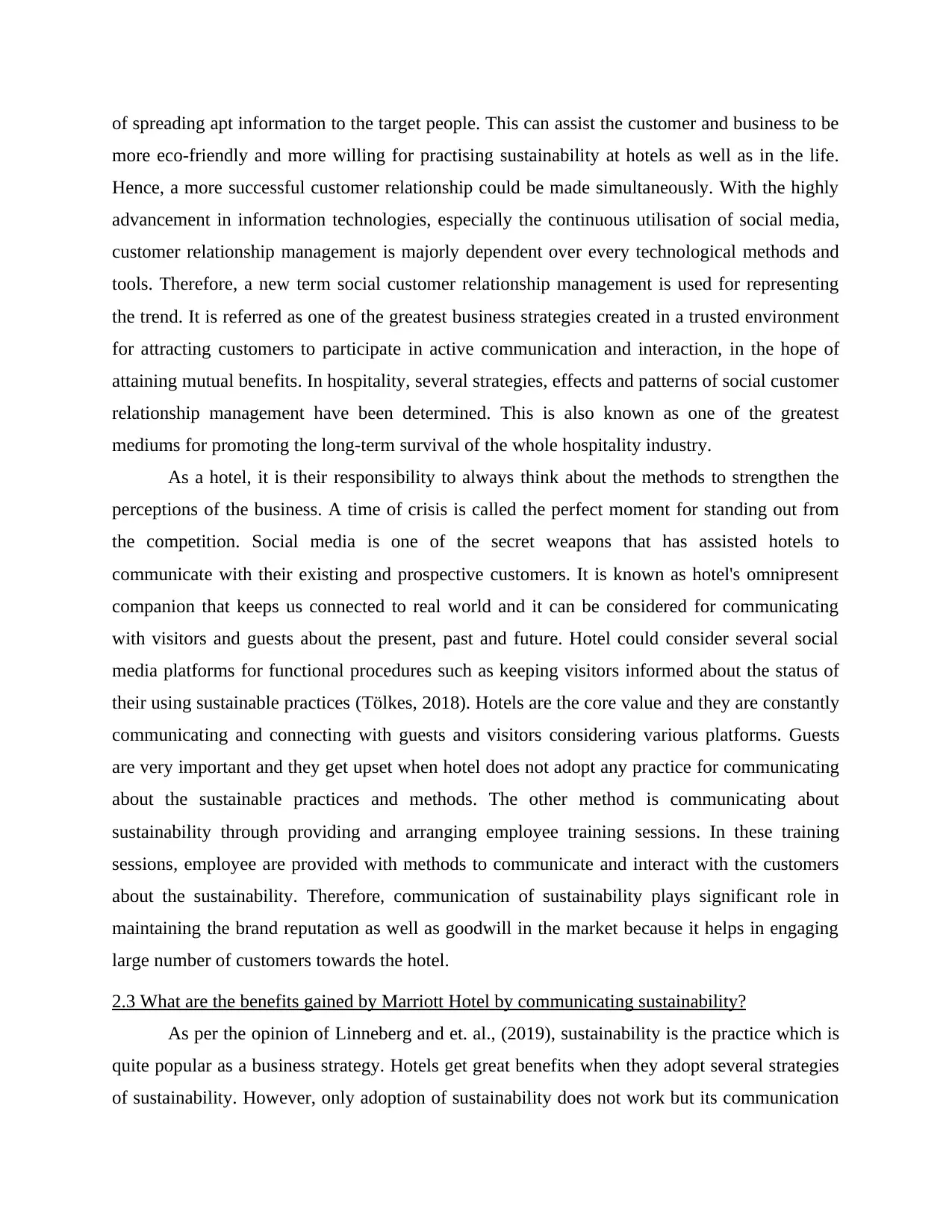
of spreading apt information to the target people. This can assist the customer and business to be
more eco-friendly and more willing for practising sustainability at hotels as well as in the life.
Hence, a more successful customer relationship could be made simultaneously. With the highly
advancement in information technologies, especially the continuous utilisation of social media,
customer relationship management is majorly dependent over every technological methods and
tools. Therefore, a new term social customer relationship management is used for representing
the trend. It is referred as one of the greatest business strategies created in a trusted environment
for attracting customers to participate in active communication and interaction, in the hope of
attaining mutual benefits. In hospitality, several strategies, effects and patterns of social customer
relationship management have been determined. This is also known as one of the greatest
mediums for promoting the long-term survival of the whole hospitality industry.
As a hotel, it is their responsibility to always think about the methods to strengthen the
perceptions of the business. A time of crisis is called the perfect moment for standing out from
the competition. Social media is one of the secret weapons that has assisted hotels to
communicate with their existing and prospective customers. It is known as hotel's omnipresent
companion that keeps us connected to real world and it can be considered for communicating
with visitors and guests about the present, past and future. Hotel could consider several social
media platforms for functional procedures such as keeping visitors informed about the status of
their using sustainable practices (Tölkes, 2018). Hotels are the core value and they are constantly
communicating and connecting with guests and visitors considering various platforms. Guests
are very important and they get upset when hotel does not adopt any practice for communicating
about the sustainable practices and methods. The other method is communicating about
sustainability through providing and arranging employee training sessions. In these training
sessions, employee are provided with methods to communicate and interact with the customers
about the sustainability. Therefore, communication of sustainability plays significant role in
maintaining the brand reputation as well as goodwill in the market because it helps in engaging
large number of customers towards the hotel.
2.3 What are the benefits gained by Marriott Hotel by communicating sustainability?
As per the opinion of Linneberg and et. al., (2019), sustainability is the practice which is
quite popular as a business strategy. Hotels get great benefits when they adopt several strategies
of sustainability. However, only adoption of sustainability does not work but its communication
more eco-friendly and more willing for practising sustainability at hotels as well as in the life.
Hence, a more successful customer relationship could be made simultaneously. With the highly
advancement in information technologies, especially the continuous utilisation of social media,
customer relationship management is majorly dependent over every technological methods and
tools. Therefore, a new term social customer relationship management is used for representing
the trend. It is referred as one of the greatest business strategies created in a trusted environment
for attracting customers to participate in active communication and interaction, in the hope of
attaining mutual benefits. In hospitality, several strategies, effects and patterns of social customer
relationship management have been determined. This is also known as one of the greatest
mediums for promoting the long-term survival of the whole hospitality industry.
As a hotel, it is their responsibility to always think about the methods to strengthen the
perceptions of the business. A time of crisis is called the perfect moment for standing out from
the competition. Social media is one of the secret weapons that has assisted hotels to
communicate with their existing and prospective customers. It is known as hotel's omnipresent
companion that keeps us connected to real world and it can be considered for communicating
with visitors and guests about the present, past and future. Hotel could consider several social
media platforms for functional procedures such as keeping visitors informed about the status of
their using sustainable practices (Tölkes, 2018). Hotels are the core value and they are constantly
communicating and connecting with guests and visitors considering various platforms. Guests
are very important and they get upset when hotel does not adopt any practice for communicating
about the sustainable practices and methods. The other method is communicating about
sustainability through providing and arranging employee training sessions. In these training
sessions, employee are provided with methods to communicate and interact with the customers
about the sustainability. Therefore, communication of sustainability plays significant role in
maintaining the brand reputation as well as goodwill in the market because it helps in engaging
large number of customers towards the hotel.
2.3 What are the benefits gained by Marriott Hotel by communicating sustainability?
As per the opinion of Linneberg and et. al., (2019), sustainability is the practice which is
quite popular as a business strategy. Hotels get great benefits when they adopt several strategies
of sustainability. However, only adoption of sustainability does not work but its communication
⊘ This is a preview!⊘
Do you want full access?
Subscribe today to unlock all pages.

Trusted by 1+ million students worldwide
1 out of 31
Related Documents
Your All-in-One AI-Powered Toolkit for Academic Success.
+13062052269
info@desklib.com
Available 24*7 on WhatsApp / Email
![[object Object]](/_next/static/media/star-bottom.7253800d.svg)
Unlock your academic potential
Copyright © 2020–2026 A2Z Services. All Rights Reserved. Developed and managed by ZUCOL.




